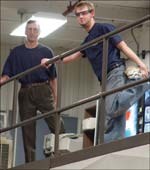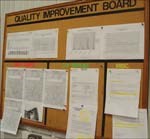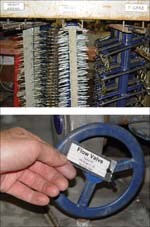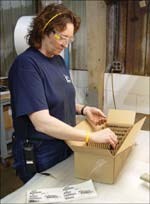A "Fishy" Philosophy
Professional Plating, Inc. (Brillion, WI) has established itself as one of the industry's premier job shops. Its formula for success includes a strong safety acumen, a plethora of value-added services and – inspired by the most unlikely of role-models – a whole lot of fun…
For Larry Dietz, it's what he experienced before entering the industrial finishing industry that has helped him most in his job as the general manager of Brillion, WI-based Professional Plating, Inc.
Dietz—who has been with PPI for just more than four years now—had spent the bulk of his career building small engines for Tecumseh Products, for companies such as Ariens, John Deere, Toro and Simplicity to name a few. In that capacity, he had used a lot of outside finishing services. He also dealt with a lot of the hassles—everything from missed deadlines to lost parts—that can sometimes occur as parts make their way through the supply chain.
"All of the issues I had dealt with before coming to PPI… knowing how it feels to be the customer whose parts are lost or damaged. It really helped prepare me for this opportunity," he says.
Given his first-hand experience with the frustration that occurs when your outside finisher doesn't come through, it comes as no surprise that Dietz and the rest of PPI's management team are so squarely focused on making the PPI relationship as simple and painless as possible for the customer. And in doing so, they've emphasized the need to deliver repeatable, consistent results.
A Brief History
Professional Plating, Inc. (PPI) got its start 26 years ago as an offshoot of Endries International, a business-to-business service provider of vendor managed inventory programs. Initially, the owners of Endries established PPI for the purpose of serving as an in-house vendor of zinc barrel plating of fasteners used in their products, but it wasn't long before the company was taking on jobs from outside customers.
Four years after its inception, PPI added the first of two rack zinc plating lines (the second would be added in 1993). In 1988, customer demand for e-coat prompted the addition of an epoxy e-coat line. Since that time, PPI has enjoyed steady growth, introducing acrylic e-coat and a state-of-the-art powder coating system. Along the way, the facility has grown from 10,000 sq ft to 85,000 sq ft and its labs, parts washing and waste management systems have all been updated.
Today, 40% percent of PPI's work—which includes jobs for the automotive, outdoor power equipment, wire forming and stamping industries—is done on its three plating lines. E-coat accounts for another 40%, with powder coating—the latest addition to PPI's repertoire—accounting for approximately 20% of its business.
According to Dietz, the ability to perform both e-coat and powder coat—a growing trend in the industry—has given PPI a huge advantage over many of its competitors. "It's something we've been able to effectively market," he says. "We can be a one-stop shop for many of our customers. With today's reduced lead-times, we can send a part from e-coat to powder and save three days in the cycle, not to mention a lot of the customer's expense shipping parts from one shop to another."
In addition to its standard finishes, PPI offers its own proprietary extended life zinc finish, dubbed Pro-Dura Clear. The hex-free coating is marketed as an extended life, environmentally-friendly finish, capable of providing a chrome-like appearance on many substrates. According to PPI, the performance achieved to white rust is 120 hours and to red rust is more than 430 hours with a 0.2 mil minimum thickness.
While variety may be the spice of life, it's clearly just one of the reasons why PPI has enjoyed so much success over the last quarter century. Closer inspection reveals that the shop owes many of its conquests to a trio of management philosophies that emphasize safety, fun and value.
A Culture of Safety
"We had a bad safety record four years ago," says Dietz of the 27 safety incidents recorded at Professional Plating in 2001.
But thanks to a two-pronged approach to safety and ergonomics, PPI's safety record has improved dramatically. The company recorded just eight minor incidents last year, none of which were machine related.
The first component of PPI's safety philosophy involves updating and maintaining the equipment found in the job shop. PPI has made a number of investments in recent years, the latest of which is a $25,000 air ventilation and evacuation system in the shop's barrel strip area.
"Preventive maintenance is a big part of safety," says Dietz. "Just as many people take their car into the dealer for an oil change every 3,000 miles, we're constantly examining the equipment here in the shop, looking for areas that need to be updated and improved."
The second aspect of PPI's approach to safety involves employee instruction in the areas of safety and ergonomics. Among the measures employed by PPI, employees are required to spend the first 15 minutes of their shift stretching out, in order to reduce the risk of muscle injury.
As part of its approach to safety, PPI employs several of the principles of the 5S for Safety (sort, set in order, shine, standardize and sustain) philosophy. At PPI, the layout of the shop is designed to not only facilitate workflow, but also to ensure the safest possible working environment for the employees. Aisles and work spaces are extra wide for better maneuverability and clutter is something that is not tolerated. Racks and tooling are stored in out-of-the-way but easy-to-access areas, and everything in the shop—from the largest rack storage system to the smallest valve—is clearly labeled.
Documentation is very big at PPI and serves to promote both safety and quality. Binders are maintained for each of the coating lines. Each binder contains illustrations and documentation on how the line operates, and how different part types should be handled. One of Dietz's future goals is to transfer the information to computers, so that employees can simply call the information up on a nearby monitor when they have a question or concern about a particular process.
Dietz credits PPI's pursuit of QS 9000 certification (which it received in 2002) as helping PPI go from the image of what plating "used to be"—dirty, poorly lit areas where breathing is difficult—to a clean, well-lit shop where safety and quality are always top priorities.
A Culture of Fun
While there's no doubt that employee safety is the number one priority at PPI, Dietz feels strongly that it is not incompatible with fun.
Consequently, the PPI management team has borrowed a page from the Pike Place Fish Market in Seattle, WA where tourists from all over the world watch in awe as large, slippery fish go sailing through the air. "On the face of it, you couldn't find a less glamorous job than a fishmonger," he says. "Yet, at Pike Place, they've tapped into an attitude that makes the job incredibly fun to watch and perform."
Lest you think that PPI's employees are recklessly tossing their customer's parts around the shop, rest assured that the philosophy—which is explored in the book Fish! A Remarkable Way to Boost Moral and Improve Results—relies largely on building a sense of trust between employees and management, effective communication and good, clean fun.
"Saying ‘thank you' is such a huge part of employee morale," offers Dietz, "That's especially true where your second and third shifts are concerned. Because of the hours they work, those folks don't have a lot of interaction with management, which works mostly during the day."
"At a lot of job shops, the only time the second and third shift employees hear from management is when something is wrong," adds Kevin Johnsrud, PPI's sales manager. "They don't hear a lot of praise." At PPI, managers go out of their way to express their gratitude to employees on all three shifts. The management team uses a variety of means—everything from one-on-one conversations to handwritten notes and personalized e-mails (every member of PPI's staff has e-mail access) to say "thanks."
For PPI's owner, Bob Endries, another way of saying "thanks" is its success bonus program, which pays back to each employee a percentage of the company's profits on a quarterly basis. The monies are paid out on the basis of four areas—quality, safety, delivery and overall profitability. Each of the areas have a target value of four points, for a total of 16 points. The closer the PPI team comes to meeting all 16 points, the larger their quarterly check is.
As another part of its pursuit of fun, PPI has an eight-person team responsible for planning events, such as bowling and golf tournaments, pot-luck luncheons and other activities. "We wanted to create an atmosphere where employees don't know what's going to happen next, in a positive way," says Dietz.
A Culture of Value
"Competing strictly on the basis of price isn't working for anyone, these days," says Johnsrud. "And it's not something that PPI is willing to do anyway."
PPI offers its customers a virtual cornucopia of value added services, designed to reduce customer expense and hassle while building brand loyalty. For instance, the shop has its own fleet of trucks and offers daily pick-up and delivery to much of Wisconsin. Professional Plating also provides sub-assembly and custom packaging for customers who want to take advantage of it. In some instances, the company even assembles, packages, ships and sells entire kits—such as kitchen and bathroom accessories, like towel racks—on behalf of its customers.
One of the major components of PPI's value culture is the Customer Portfolio, an information packet that, says Johnsrud, "tells first-time customers everything they need to know about Professional Plating." The Portfolio provides information such as billing and invoicing terms, contact telephone and fax numbers, e-mail addresses for key personnel and shipping and receiving hours. "Rather than waiting until [after a customer starts doing business with PPI] and trying to fit them into a mold," offers Dietz, "the portfolio gives them all of the information they could possibly need before we ever tackle the first part."
At PPI, the idea of maximizing value isn't limited to interaction with external customers. The shop's leaders have taken an almost obsessive approach to eliminating non-value added activities (any unnecessary activity that does not add market form or function) from the day-to-day events that take place in the job shop. Ideas for reducing or eliminating non-value added functions are welcomed by the management team and no suggestion is dismissed without careful consideration.
As part of this continuous effort, PPI recently began offering its customers the option of having invoices e-mailed to them. Doing so not only makes the process more efficient, it also reduces the cost of invoicing, providing a positive impact on the customer's cost.
Dietz and Johnsrud will be the first to acknowledge that, because consistency and repeatability are so highly prized at PPI, the shop is not going to be the market's lowest priced finisher in a lot of cases. But at the same time, few shops can offer as many benefits. "At the end of the day, I think it's the value-added work we do that makes the difference between us and our competitors," says Dietz. "It allows us to be the company that's easiest to do business with."
Read Next
Delivering Increased Benefits to Greenhouse Films
Baystar's Borstar technology is helping customers deliver better, more reliable production methods to greenhouse agriculture.
Read MoreEpisode 45: An Interview with Chandler Mancuso, MacDermid Envio Solutions
Chandler Mancuso, technical director with MacDermid Envio discusses updating your wastewater treatment system and implementing materials recycling solutions to increase efficiencies, control costs and reduce environmental impact.
Read MoreEducation Bringing Cleaning to Machining
Debuting new speakers and cleaning technology content during this half-day workshop co-located with IMTS 2024.
Read More




















.jpg;maxWidth=300;quality=90)



